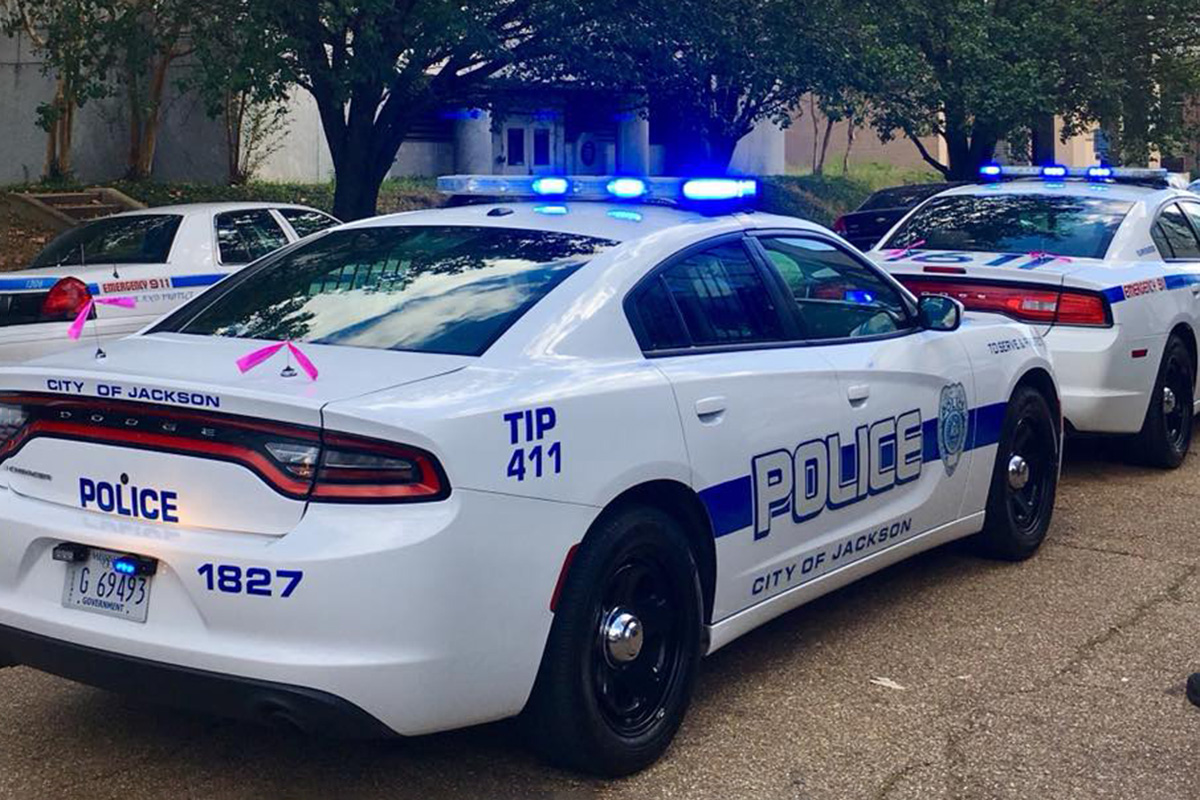Anita Gibbs, 58, went through a Jackson Police Department roadblock on Ellis Avenue last week, showing officers her valid license and insurance card. On her way back from picking up her daughter, she encountered a different roadblock on the other side of the same road. She decided to take a more extended route home rather than go through the roadblock with her daughter in the car.
Gibbs has lived in west Jackson, a majority-Black area, for more than 20 years. While she worked in the majority-white area of the capital city, she has never experienced JPD checkpoints, but has encountered several in the capital city’s majority-Black and low-income areas.
She joined four other plaintiffs—Lauren Rhoades, LaQuenza Morgan, Archie Skiffer Jr. and Timothy Halcomb—to file a federal lawsuit styled Gibbs v. City of Jackson on Feb. 23, 2022, against the City of Jackson and Police Chief James E. Davis. They claim JPD violates the rights of citizens who have done nothing wrong through the use and placement of the roadblocks, ostensibly set up to prevent crime.
“The Jackson Police Department is enforcing a set of roadblock procedures dubbed ‘Ticket Arrest Tow’ (TAT) that has led to the disproportionate placement of vehicular roadblocks, or checkpoints, in majority-Black and low-income neighborhoods. Citizens in these areas who have done nothing wrong are routinely stopped and delayed as they go about their business because the City believes this is an effective method of crime control. But it is not,” Mississippi Center for Justice attorneys Paloma Wu and Rob McDuff state in the filing.
“More importantly, these wholesale stops of citizens in the name of crime control, without any reason to believe they have committed crimes, is a violation of their rights under the Fourth Amendment to the United States Constitution to be free of unreasonable searches and seizures.”
The attorneys argue that such practices are particularly egregious for Black Mississippians who lived through segregated treatment in the past.
“Being disproportionately subjected to JPD roadblocks reminds Ms. Gibbs of how it felt to be a girl walking in downtown Jackson when she was not allowed to go into certain stores or was treated differently when she did,” the brief argued.
ACLU: ‘Ticket, Arrest, Tow’ Not Based on Probable Cause
In a Feb. 17, 2022, statement, the American Civil Liberties Union of Mississippi warned against the City’s Ticket, Arrest, Tow (TAT) initiative, which began January 2022, saying that it targets motorists through traffic stops that are not based on probable cause.

“It is unconstitutional to set up checkpoints for the general purpose of crime control. Furthermore, checkpoints are not proven to reduce crime,” the organization wrote. “The extreme targeting of motorists, often in Black neighborhoods, is unconstitutional and impacts people’s ability to go to work, run errands, and take care of their families. These are liberties we all should be able to enjoy freely.”
In many U.S. cities, the controversial and now largely discredited “Broken Windows” and unconstitutional stop-and-frisk approach to policing—first popularized by then-New York Mayor Rudy Giuliani—used low-level, misdemeanor arrests as a way to find and lock up people detained who had outstanding warrants. But Jackson’s roadblock strategy is stopping people who show no evidence of criminal activity because they are in certain neighborhoods.
“In addition, fines and fees resulting from traffic stops disproportionately impact communities of color and people who are poor. This criminal debt can accumulate and create an unending cycle of citation, arrest, fine, court, and even jail,” the ACLU continued in last week’s statement.
Should JPD find someone with an outstanding warrant in the roadblocks, those people could be detained in Hinds County where many detainees cannot afford bail. Recently, as the Mississippi Free Press reported, both JPD Chief James Davis and several Democratic senators and supervisors from Jackson endorsed both the use of often-lengthy pretrial detention in dangerous jails for those who cannot afford bail as a crime-prevention strategy. They also endorsed building a misdemeanor jail to detain those arrested on misdemeanors who could not afford bail.
Casting such a wide net to lock up people in case they might commit violence in the future drew harsh criticism from an anti-violence expert who helped investigate Jackson crime causes and potential solutions for a 2016 BOTEC Analysis report the Mississippi Legislature ordered.
“(The move is) based upon the assumption that people will learn a lesson by being incarcerated,” Ron Noblett told the Mississippi Free Press. “The only thing people learn from incarceration is resentment and how to be a better criminal.”
“Treatment and helping the situations that they come out of, and the source of the actions is the only answer,” he added. “Jails do not help; jails do not teach, jails do not train except how to be a bigger, a better criminal.”
“Basically, I think being locked up for a misdemeanor is counterproductive.”
Plaintiffs: Stop the Roadblocks
The plaintiffs in the new lawsuit against the City of Jackson for roadblocks seek various reliefs from the court, including urging the City of Jackson to stop the practice, stop disproportionately locating the roadblock in majority-Black and low-income neighborhoods, and adequate training for the department to prevent further occurrence.
“JPD’s roadblock practices have unconstitutionally interrupted and prevented the movement of thousands of people as they go about their lives, often for significant periods of time,” the brief said.
The lawsuit explained that officers give tickets to all drivers who do not have a license or current insurance and tow their cars under TAT. “In many instances, the motorists are also arrested and taken to police facilities where they are photographed and fingerprinted so their mugshots and fingerprints can be used in the search for people who commit crimes,” the lawsuit added.

On Feb. 14, 2022, Mayor Lumumba endorsed the roadblocks, saying they are a way to address rising crimes, saying that those without proper documentation receive citations. “And there are penalties associated with that,” he said at the press briefing.
“These roadblocks are important when we’ve had communities that have been plagued by carjackings, plagued by various forms of violence,” explained the mayor lauded nationally as a progressive policing reformer. “These are useful tools to the police department to help mitigate some of those concerns.”
“I do want to express to the community the importance of these roadblocks,” Lumumba added. “We know that the issues that we suffer from are multifaceted, and they require a multi-layered approach; but as it pertains to these roadblocks, they will be achieved for the purposes of making communities safer.”
After a request for comment about the lawsuit, the mayor’s executive writer Justin Vicory informed the Mississippi Free Press in an email Thursday that the mayor “has no comment at this time since it is a legal matter,” and referenced the Feb. 14, 2022, press briefing.
Chief Davis: Not Targeting Specific People, Groups
Mississippi Justice Center President and CEO Vangela M. Wade emphasized that the absence of a current driver’s license, auto registration, or liability insurance is not necessarily indicative of criminal behavior or intent, Thursday’s press release stated.
The Mississippi Justice Center brief filed Wednesday quoted “a JPD spokesperson” saying on Feb. 16 that “due to the fact that we come across some of these violent criminals who are wanted … that is the purpose of us having these checkpoints.”

The U.S. Supreme Court has upheld the use of police roadblocks for targeting of specific situations and people, such as catching a suspect killer on the loose in an area, but not random roadblocks in a general pursuit of solving crime and violence or to make a city safer.
On Friday Feb. 18, 2022, Police Chief Davis, who is named as a plaintiff in the lawsuit, confirmed that JPD is not targeting specific people in the roadblocks, as quoted in the new class-action brief: “People think that it’s roadblocks, that’s the public concept, and they took it wrong, like there’s something that we’re targeting—a certain group of people. Our intent is to get wanted individuals off the streets.”
“We are doing everything we can to keep Jackson safe,” Davis also said on Feb. 18. “We’ve got individuals with outstanding warrants that is wanted, and we’re looking to bring them to justice.”

The Mississippi Alliance for Public Safety, which is also working with the Mississippi Justice Center on the lawsuit, added communities are not safer when the police arrest their neighbors and impound their cars, preventing them from going to work.
“By routinely stopping people in certain neighborhoods for crime-control purposes without any reason to believe they have committed crimes, TAT treats them like wanted suspects as they drive to and from school or work or for other legitimate reasons,” the MJC continued.
“Just as the police cannot walk in every home to search for evidence of a crime or stop and delay every citizen walking down the street to pat them down for drugs or illegal weapons or check their drivers licenses to see if they are wanted for a crime, they cannot do the same with every motorist on the public roads.










